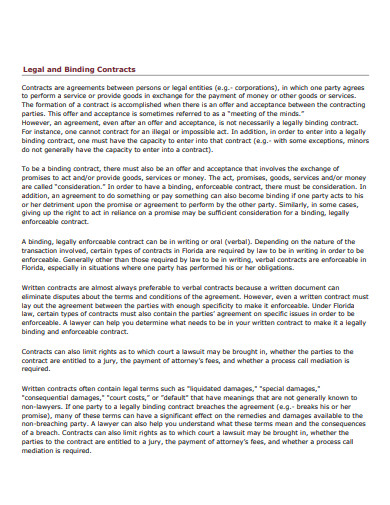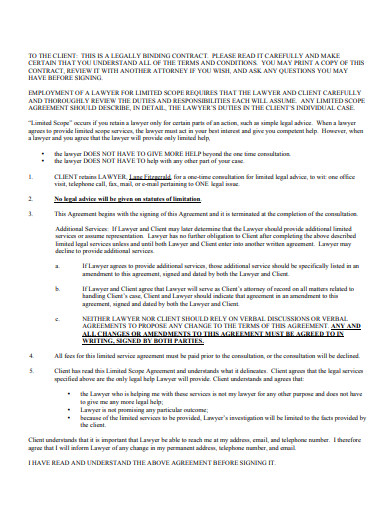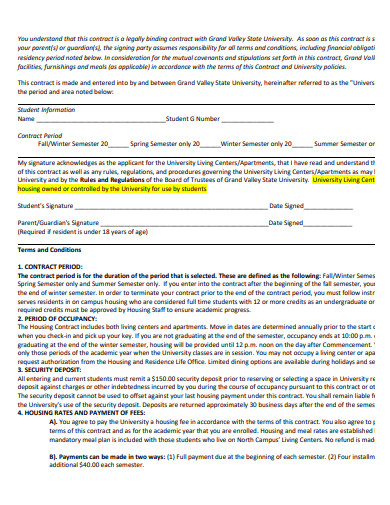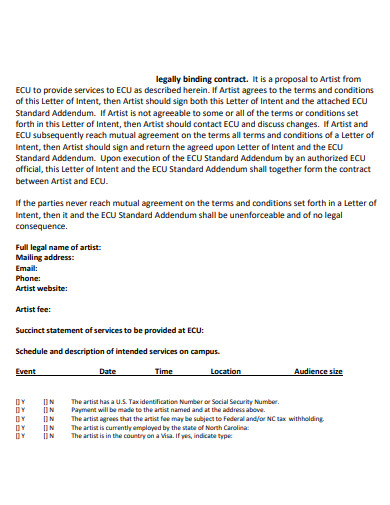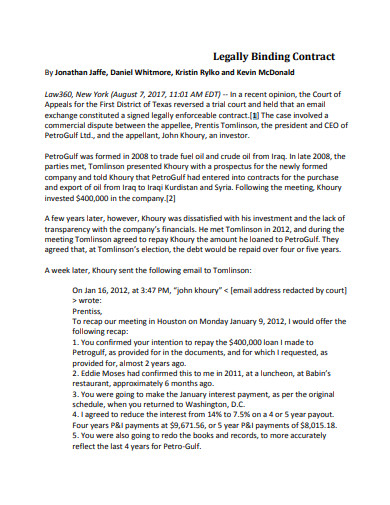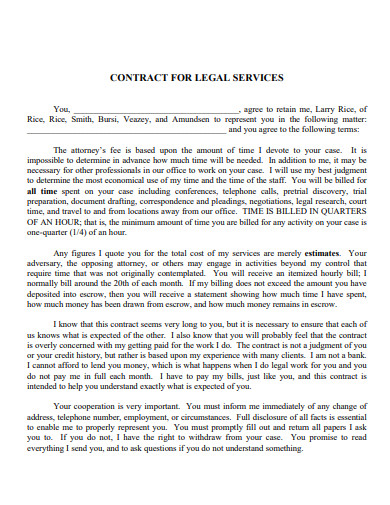6+ Legal Binding Contract Samples
In contract law, legal purpose refers to the need that the contract’s object, or reason for being, be legal. Contracts are a reality of life in business, whether you’re dealing with a customer, a vendor, or an independent contractor. They’re necessary since they act as legally binding agreements that safeguard your interests. Do you require one? We’ve got your back! In this article, we provide you with free and ready-made samples of Legal Binding Contracts in PDF and DOC formats that you could use for your benefit. Keep on reading to find out more!
1. Legal Binding Contract
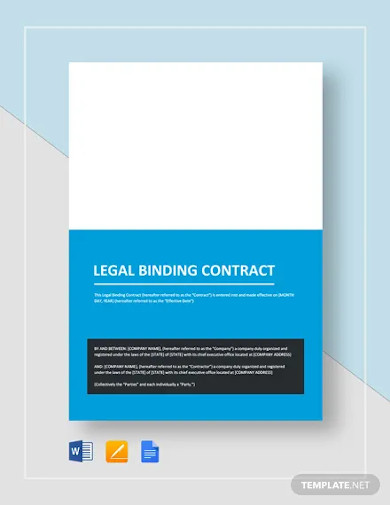
2. Sample Legal Binding Contract
3. Simple Legal Binding Contract
4. Legal Binding Contract Example
5. Basic Legal Binding Contract
6. Formal Legal Binding Contract
7. Legal Binding Services Contract
What Is a Legally Binding Contract?
Contracts that are legally binding are agreements between two or more parties that are enforceable by law and valid under federal and state contract laws. Because a contract is legally binding, all parties must adhere to its terms and perform the tasks specified in it. Except for minors, convicts, and those of unsound mind, anybody can enter into a contract. The parties must be identified in the contract; normally, names are adequate, although addresses or titles may be used in specific cases.
How to Make a Legally Binding Contract
A contract’s purpose is to properly define an agreement so that the goals of any agreement is achieved while avoiding conflicts or litigation. A Legally Binding Contract Template can help provide you with the framework you need to ensure that you have a well-prepared and robust contract on hand. To do so, you can choose one of our excellent templates listed above. If you want to write it yourself, follow these steps below to guide you:
1. Describe the contract’s parties.
Except for minors, convicts, and those of unsound mind, anybody can enter into a contract. The parties must be identified in the contract; normally, names are adequate, although addresses or titles may be used in specific cases. In sales agreements, for example, the seller and the buyer are commonly used in addition to names to better characterize the parties.
2. Make the consent of all parties involved a top priority.
A legitimate contract also necessitates the permission of the parties, which must be free, mutual, and disclosed to one another. When consent is obtained under coercion, threat, fraud, undue influence, or error, it is not free. The intricacies of various factors have been the subject of books. Of course, not all cases are so straightforward, and the law must be applied to each one individually.
3. Define the agreement’s purpose.
The agreed-upon item is sometimes referred to as the object or subject. It must be legal, feasible, and certain. A contract to undertake an illegal act, for example, will not be enforced by a court. Drug deals frequently go wrong, but a person who pays for narcotics that aren’t delivered won’t be able to get their money back through the courts.
4. Provide the parties’ consideration.
Every transaction requires consideration, which means that both parties must benefit. It could be anything that is done or not done. When one side commits to do or not do something, they must earn something in return.
5. Last but not the least, don’t forget to put your agreement in writing.
Certain contracts are only valid if they are written down. They usually deal with real estate, certain debts, money beyond a particular amount, or goods that won’t be completed within a year or throughout the promisor’s lifespan. Exceptions, of course, can be as broad as the rules. Even if the agreement isn’t need to be in writing, all of the other requirements of a valid contract must be met.
FAQ
What are the four conditions that must be met in order for a contract to be valid?
To establish that a contract exists, the complaining party must provide four factors. Offer, deliberation, acceptance, and mutuality are the four aspects.
What is a legally binding document?
Both parties must sign a document for it to be legally binding.
Is it legal to have a handwritten contract?
Yes, to put it succinctly. Handwritten contracts are little inconvenient as compared to typed contracts, but they are perfectly legal if properly prepared. In many respects, they’re even better than verbal agreements.
The final conclusion is that, while most parties enter into agreements in good faith, the best protection in the event of a dispute is a well-written contract. To help you get started, download our easily customizable and comprehensive samples of Legal Binding Contracts today!
Related Posts
Argumentative Writing Samples & Templates
Contract Cancellation Letter Samples & Templates
Sample Material Lists
Sample Excuse Letter for School
Feature Writing Samples
FREE 10+ Security Guard Contract Samples in PDF | MS Word
FREE 10+ Option to Purchase Agreement Samples in MS Word | Apple Pages | PDF
FREE 26+ Curriculum Form Samples in MS Word | PDF
FREE 20+ Cleaning Service Proposal Samples in PDF | MS Word
FREE 29+ Sample Loan Application Form Templates in MS Word | PDF
FREE 10+ Event Venue Contract Samples in PDF | MS Word | Pages | Google Docs
FREE 10+ SBAR Samples in PDF | DOC
FREE 12+ Music Band Contract Templates in PDF | MS Word
FREE 10+ HVAC Maintenance Contract Samples in PDF | MS Word
FREE 10+ Social Media Marketing Contract Samples in MS Word | PDF

